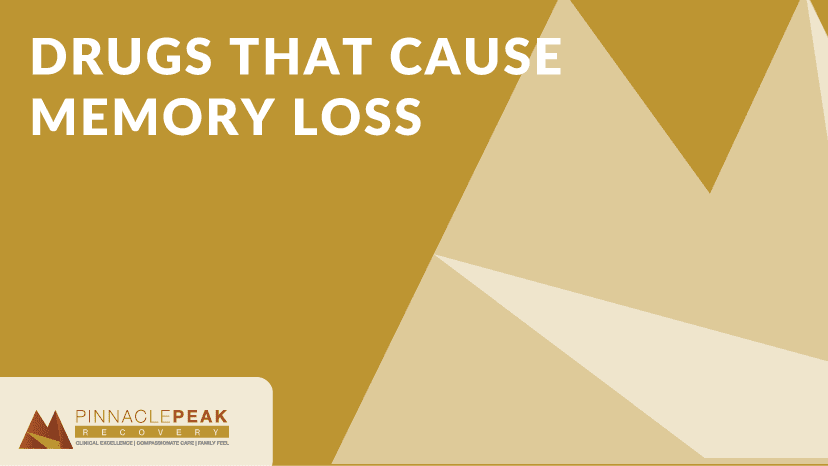Many using drugs do not keep readily in mind the possible short- and long-term side effects they may have as a result of use. One of the scarier possible side effects of using substances is memory loss.
Memories are the foundation from which we build our future and also reflect upon the past. Losing our memories could result in losing the feelings, thoughts, and relationships tied to those memories. Memory loss can also affect our ability to perform important tasks both at work and in our personal lives.

Read on to learn more about memory, why memory matters, and the many addictive drugs that can lead to memory loss. Also, we will discuss addiction treatment available at Pinnacle Peak Recovery in Arizona.
Pinnacle Peak Recovery is happy to help Arizonans overcome their addiction to any of the many addictive drugs that may lead to memory loss.
What Is Memory? Why Does It Matter?
According to an introductory psychology textbook, memory is the retention of information or experience over time as the result of three key processes: encoding, storage, and retrieval.
Encoding is getting information into memory. This could include encoding sights and sounds. Encoding is like taking a photo with a camera.
Storage is retaining information over time. Think of storage as similar to taking the photos off your camera, printing them, and adding them to a photo album.
Retrieval is taking information out of storage. Think of retrieval as flipping through the photo album. While flipping through the photos in the photo album, you have the opportunity to recall past details and experiences.
Memories play an important role in our bonds with others and our own personal sense of identity.
Drugs That Cause Memory Loss Alcohol
According to the National Library of Medicine, alcohol is a central nervous system depressant, or a drug that slows down brain activity.
Alcohol can cause changes to mood, behavior, and self-control. Alcohol can also cause problems related to memory and thinking clearly, as well as affect coordination and physical control.
Alcohol has effects on other bodily organs. For example, alcohol can raise blood pressure and heart rate.
According to The Alcohol Pharmacology Education Partnership, when a person drinks alcohol and has a “blackout,” they may have a small memory disruption, or it could be more serious. An example of small memory disruption is forgetting someone’s name.
A more serious result of having a “blackout” is not remembering important details of the events that happened while drinking. The inability to remember the entire events that happened while drinking occurs when a person engages in binge drinking, which is generally defined as having 5 or more drinks in a single sitting.
Alcohol Use Disorder Statistics in Arizona
Alcohol use disorder is one of the reasons that people enter into an alcohol addiction treatment center.
According to data from the 2019 National Survey on Drug Use and Health and the National Survey of Substance Abuse Treatment Services, among people 12 or older in Arizona, the yearly average percentage of alcohol use disorder in the past year decreased from 2002 to 2004 and 2017 to 2019.
From 2017 to 2019, the yearly average prevalence of past-year alcohol use disorder in Arizona was 4.7% (or 279,000 people), which was lower than the regional average (5.9%), but similar to the national average (5.3%).

Marijuana
According to the National Institute on Drug Abuse, marijuana (other names used: weed, herb, pot, grass, bud, ganja, Mary Jane, etc.) is a mixture of the dried flowers of Cannabis sativa. Marijuana is greenish-gray in color.
Marijuana can be used in many different forms, including in joints (hand-rolled cigarettes), in pipes or bongs, or in blunts, which is marijuana rolled up in cigar wrappers.
Marijuana can be mixed into foods called edibles. Marijuana can be consumed within many foods, such as brownies, cookies, or candies. Marijuana can also be vaped.
According to an article titled “The Effects of Marijuana on Your Memory,” published by Harvard Health Publishing, marijuana can produce short-term problems with thinking, working memory, executive function, and psychomotor function. Psychomotor function includes physical actions that require conscious thought or awareness. Psychomotor function examples include driving a vehicle and playing an instrument.
Why does marijuana cause short-term memory problems? Marijuana’s main psychoactive chemical, THC, attaches to brain receptors in regions that are important for memory formation. These brain regions that are important for memory include the hippocampus, amygdala, and cerebral cortex.
What about long-term memory problems as a result of marijuana use? According to the Harvard Health Publishing article, the extent to which long-term use of marijuana results in cognitive (thinking) problems is not known.
Lifestyle issues like memory loss can lead users to seek marijuana addiction treatment.
Marijuana Use Disorder Statistics in Arizona
According to data from the 2019 National Survey on Drug Use and Health and the National Survey of Substance Abuse Treatment Services, among people 12 or older in Arizona, the yearly average percentage of marijuana use disorder in the past year decreased from 2002 to 2004 and 2017 to 2019.
From 2017 to 2019, the yearly average prevalence of past-year marijuana use disorder
in Arizona was 1.2% (or 73,000 people), which was lower than the regional average (2.0%), but similar to the national average (1.6%).
Methamphetamine (Meth)
According to information from the National Library of Medicine, methamphetamine or “meth” is a highly addictive stimulant drug.
Meth can be made into powder or rock form. Meth powder can be eaten or snorted via the nose. Meth powder may also be mixed with liquid, then injected into the body with a needle. Crystal meth is smoked using a small glass pipe.
The effects of meth are first a rush of good feelings, then a feeling of edginess, excitement, anger, and fear. Medical problems associated with meth use include high body temperature that leads to passing out, severe itching, “meth mouth” or broken teeth and dry mouth, and thinking and emotional problems.
According to the article “Can cognitive impairments caused by methamphetamine use perpetuate the addiction cycle?,” ongoing use of meth can cause changes in the brain and lead to cognitive impairments or difficulties. This effect may strengthen or continue to encourage a person’s addiction to meth.
According to this article, past studies have found that meth affects many cognitive domains such as a user’s attention, impulsivity, and memory.
It is notable that meth consumption can impair a person’s ability to recall events planned in the future or experienced in the past, as well as lead to difficulty in mentally processing information. This article shares that meth-induced memory deficits could contribute to the meth addiction cycle.
Cocaine
According to the National Institute on Drug Abuse, cocaine is a very addictive stimulant drug. Cocaine comes from the coca leaves in South America.
The two chemical forms of cocaine are water-soluble hydrochloride salt and the water-insoluble cocaine base, also known as freebase. People that use cocaine can inject or snort cocaine powder.
According to the report “What are the long-term effects of cocaine use?,” long-term cocaine use can lead to difficulty with the following: sustaining attention, impulse restraint, memory, making decisions involving rewards or punishments, and performing motor tasks.
Is Your Loved One In Constant Need Of Pain Opioids?
Give Us A Call Today.
Narcotic Painkillers (Opioids)
According to the American Association of Retired Persons (AARP), narcotic painkillers or opioid analgesics are used to relieve moderate to severe chronic pain, such as the pain caused by rheumatoid arthritis.
Examples of narcotic painkillers include fentanyl (Duragesic), hydrocodone (Norco, Vicodin), hydromorphone (Dilaudid, Exalgo), morphine (Astramorph, Avinza), and oxycodone (OxyContin, Percocet).
Narcotic painkillers come in many different forms, including tablets, solutions for injection, transdermal patches, and suppositories. According to Merriam-Webster, a suppository is a solid, meltable cone or cylinder of typically medicated material for insertion into a bodily passage or cavity such as the rectum.
Alternatives to narcotic painkillers include nonsteroidal anti-inflammatory drugs (NSAIDs), a nonnarcotic painkiller such as tramadol (Ultram), or acetaminophen (Tylenol).
In the article “Is It Something I'm Taking?" Medications That Can Mimic Dementia,” Dr. James M. Ellison, MD, MPH, notes that the cognitive effects of pain medications are reversible once pain medications have been stopped. This is encouraging for those seeking opioid addiction treatment.
Pain Reliever (Opioid) Statistics in Arizona
According to the Centers for Disease Control and Prevention (CDC), in 2020, the state of Arizona had a 40.5 per 100 persons opioid dispensing (prescription) rate.
According to data from Arizona’s Controlled Substances Prescription Monitoring Program, as of 2013, there had been a rate of approximately 10 million Class II-IV prescriptions written and 524 million pills dispensed each year in Arizona. Prescription pain relievers account for more than half of the drugs dispensed in the state of Arizona.
In 2010, Arizona ranked 6th highest in the nation for drug overdose deaths. In 2011, Arizona had the 5th-highest opioid prescribing rate in the U.S.
Antianxiety Drugs (Benzodiazepines)
According to the American Association of Retired Persons (AARP), benzodiazepines are drugs used to treat many types of anxiety disorders, agitation, delirium and muscle spasms, and to prevent seizures.
Benzodiazepines have a sedative effect. Thus, benzodiazepines are sometimes used to treat insomnia (trouble with falling or staying asleep) and the anxiety that can go with depression.
Examples of benzodiazepines include: Alprazolam (Xanax), chlordiazepoxide (Librium), clonazepam (Klonopin), diazepam (Valium), flurazepam (Dalmane), lorazepam (Ativan), midazolam (Versed), quazepam (Doral), temazepam (Restoril) and triazolam (Halcion).
Benzodiazepines can cause memory loss by reducing activity in important parts of the brain, including the brain areas involved in moving events from short-term to long-term memory.
According to the article “‘Is It Something I'm Taking?’ Medications That Can Mimic Dementia,” by Dr. Ellison, benzodiazepines can be very helpful to those struggling with anxiety or insomnia, but can also lead to sedation and mental slowing.
According to “Benzodiazepine use and risk of Alzheimer’s disease: case-control study,” benzodiazepine use is associated with an increased risk of Alzheimer’s disease.
An alternative to taking benzodiazepines is melatonin. Melatonin can aid in establishing healthier sleeping patterns.
Addiction Treatment at Pinnacle Peak Recovery
Pinnacle Peak Recovery offers a range of addiction treatment programs in Arizona. Pinnacle Peak Recovery offers multiple levels of care to meet your needs, including drug detox, rehab, and outpatient care.
At the rehab level, we are able to treat addiction to a variety of substances, including, but not limited to: Adderall, alcohol, benzodiazepines, cocaine, heroin, marijuana, and meth.
We offer a variety of therapeutic approaches, such as experiential therapy, fitness therapy, and yoga therapy.
We use evidence-based therapy approaches in treatment, such as cognitive behavioral therapy (CBT) and dialectical behavior therapy (DBT).
At Pinnacle Peak Recovery, we do not view addiction and mental health as two separate issues, but instead as intertwined. This is why we use a dual diagnosis treatment model, emphasizing that care should be geared toward both your addiction and mental health needs.
Reach Out to Pinnacle Peak Recovery
You may have concerns about memory loss and the many other possible negative consequences that may happen as a result of ongoing drug or alcohol use.
You or your loved one is worthy of compassionate, quality addiction treatment care. To take the first step toward a healthier, more fulfilling lifestyle, please call Pinnacle Peak Recovery at 866-377-4761.
Is Your Loved One In Need Of Help With Substance Use Disorder? Call Us Today!
FAQs
What are the 9 pills that cause memory loss?
According to the American Association of Retired Persons (AARP), there are 10 drugs that cause memory loss. These drugs include antianxiety drugs (benzodiazepines), cholesterol-lowering drugs (statins), antiseizure drugs, antidepressant drugs (tricyclic antidepressants), narcotic painkillers, Parkinson's drugs (dopamine agonists), hypertension drugs (beta-blockers), sleeping aids (nonbenzodiazepine sedative-hypnotics), incontinence drugs (anticholinergics), and antihistamines (first-generation). Can drugs cause permanent memory loss?
Can drugs cause permanent memory loss?
A research study titled “Patterns of Drug Use and the Influence of Gender on Self-Reports of Memory Ability in Ecstasy Users: A Web-Based Study” found that those who used ecstasy were found to report significantly more difficulties in their long-term prospective memory and had more completion errors than those using other substances or controls.

